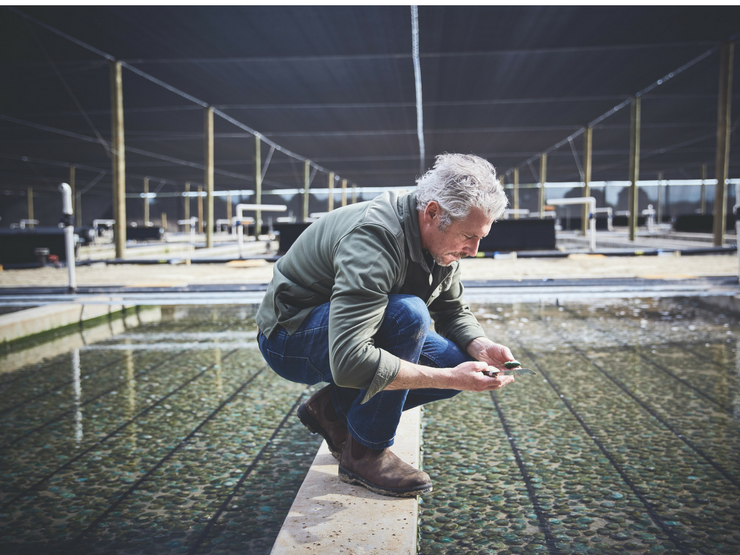On a seasonally adjusted basis, the NAB Online Retail Sales Index recorded a drop in growth in July


Insight
Fifteen years ago, two separate groups of enthusiastic investors and abalone farmers set out to secure a footing on the global stage. It wasn’t until they joined forces in 2008 that everything changed and the farms, within the space of nine years, went from individual 70-tonne entities to being the biggest producer of abalone in the southern hemisphere.

It’s the simple promise of consistency and continuity that drives the international success of abalone farmers Tim Rudge and his colleagues at Yumbah. At each stage, Yumbah focused on reinforcing itself as a reliable brand that consistently delivers on its core values. Along the way, it carved out substantial niches in both Asian and Western markets.
In the early 2000s, the need to create global demand and a premium price point for their fledgling industry led a group of Australian abalone farmers to join forces under the retail label, Ausab. Building on this initial success, the group has now consolidated and expanded, forming the company Yumbah Aquaculture to propel them into the wider shellfish market.
Making ‘Australian grown’ a selling point allowed the entire abalone industry to flourish, explains Tim Rudge, General Manager of Yumbah Narrawong, the group’s Victorian farm. “It was a great example of an industry working together to commonly market its product.”
Rudge points out that as small, single-site operators, the farmers were working with limited abalone supply. “Creating one brand let us pool our resources and reliably serve larger clients allowing the business to grow significantly.”
“By naming this group Yumbah, we bring together respect for the original inhabitants of Australia and the unique qualities of the Great Southern Ocean that feeds our abalone,” explains Rudge. “It’s with permission from the traditional custodians of the Yaygirr language that we call ourselves Yumbah, or ‘larger shellfish’.”
Selling under its established Ausab label, the Yumbah group soon carved out a significant slice of the premium sashimi-grade abalone market, and is now, according to Rudge, the world’s largest supplier of cultured greenlip abalone.
Rudge stresses that continuity of supply and quality have been the key brand building blocks of Yumbah’s identity.
“Traditionally, buyers never had the opportunity to purchase abalone consistently and at a fixed price point,” he says, arguing that abalone supply from Australia, and internationally, suffered from a lack of reliability in quantity, quality and price.
“We changed the market by offering consistency of quantity, quality and price. Ownership of our vertically integrated supply chain, our technology and the geographical spread of the farms are all key to this.”
Rudge credits much of Yumbah’s business direction and success on lessons learnt from his Japanese customers.
The high quality and supply consistency demanded by them helped perfect production processes for growing a superior product. And, rather than run a separate Japanese production line, Yumbah decided to grow everything to this higher standard – and make it the company’s market differentiator.
“Promoting this grade of sustainable and ethically-produced shellfish is a real feather in our cap,” Rudge notes with pride.
“And it’s helped position us at a premium price point in Asian and Western markets alike. If you look at our packaging2, it’s clean, contemporary and western.”
He explains the Chinese recognise and value the word ‘pure’, adding that it is this concept of purity in the Australian product that buyers prize. “It’s still a special occasion purchase for many of our customers like French champagne for us.”
Hard work on the ground has paid off for Yumbah with the product flying off the shelves of retailer Costco in Australia and the US.
“Costco has been a revelation. We now view retail sales as having the most growth potential,” explains Rudge. “We run cooking demonstrations in the stores and try to get the message out that abalone is a flash-fry product, just like calamari. It’s really simple to prepare once you know how. And very nutritious.”
While the retail Ausab label is entrenching itself in multiple markets, Rudge and his fellow farmers haven’t forgotten their bigger game plan.
“We’ve always wanted to diversify into other shellfish,” he admits.
In 2017, the first step towards this goal was taken in a joint venture with Cameron’s Oysters to produce oyster spat at the new Yumbah Port Lincoln hatchery. Further strides along the integration journey are being made with the purchase of Yumbah Aquafeed and the commissioning of the high-tech Yumbah Processing facility in Adelaide.
Says Rudge: “The ultimate goal is for Yumbah to become a world-leading producer of environmentally-sustainable shellfish.”
© National Australia Bank Limited. ABN 12 004 044 937 AFSL and Australian Credit Licence 230686.